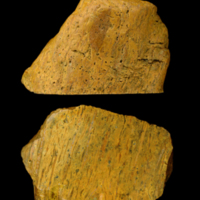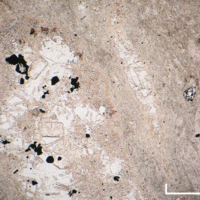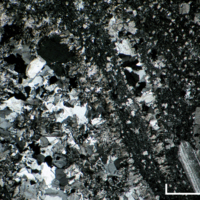- Home
- Rocks
- Type fossils
- Fossil Specimens
- Minerals
- Glossary
- Stratigraphic Chart
- Michel-Levy Chart
- Classification of igneous rocks
- University of Cambridge
- Department of Earth Sciences
- ESC Library
- Moodle
- Sedgwick Museum
- DoITPoMS
- Mindat.org
- Microfossils
- Bryozoans
- Webmineral
- Tree of Life
- CrystalMaker
- Virtual Microscope
L112 - banded rhyolite
Specimen Location
Glacial boulder
North Wales
Hand Specimen
Pink-brown, fine-grained rock.
Strong planar shear fabric, produced by flow: streaks of dark red-brown and black-brown in the groundmass, and siliceous streaks and lenses.
Gold-coloured, metallic pyrite, and a black mineral are associated with the quartz-filled lenses.
Thin-section
Plagioclase feldspar
- Phenocrysts, fairly fresh, tabular, typically 1-2 mm long, with characteristic lamellar twinning.
Opaques
- Grains associated with the quartz-filled lenses. Range of sizes from groundmass up to ~0.5 mm. These are a mixture of pyrite, FeS2, (tending to have a cubic form) and the unidentified black mineral, both seen in hand specimen.
Groundmass
- Cryptocrystalline, almost glassy, speckled with tiny, irregular quartz and feldspar crystals. Probably devitrified glass. Plagioclase altered to white mica.
Secondary quartz
- Narrow veins and lenses of quartz, considerably coarser than the groundmass. The grains of quartz have sutured contacts, and may have been injected after consolidation of the lava. Some of these clumps are rimmed with inward pointing needles of feldspar.
Rock History
Phenocrysts crystallised in a magma chamber. The magma erupted and cooled very rapidly to a fine-grained, glassy groundmass, preserving flow banding texture. Injection of quartz-rich fluid, which precipitated quartz in lenses and veins.
Very high temperature hydrothermal alteration caused devitrification of the glassy groundmass.
Rock Name
banded rhyolite
rhyloite flow



